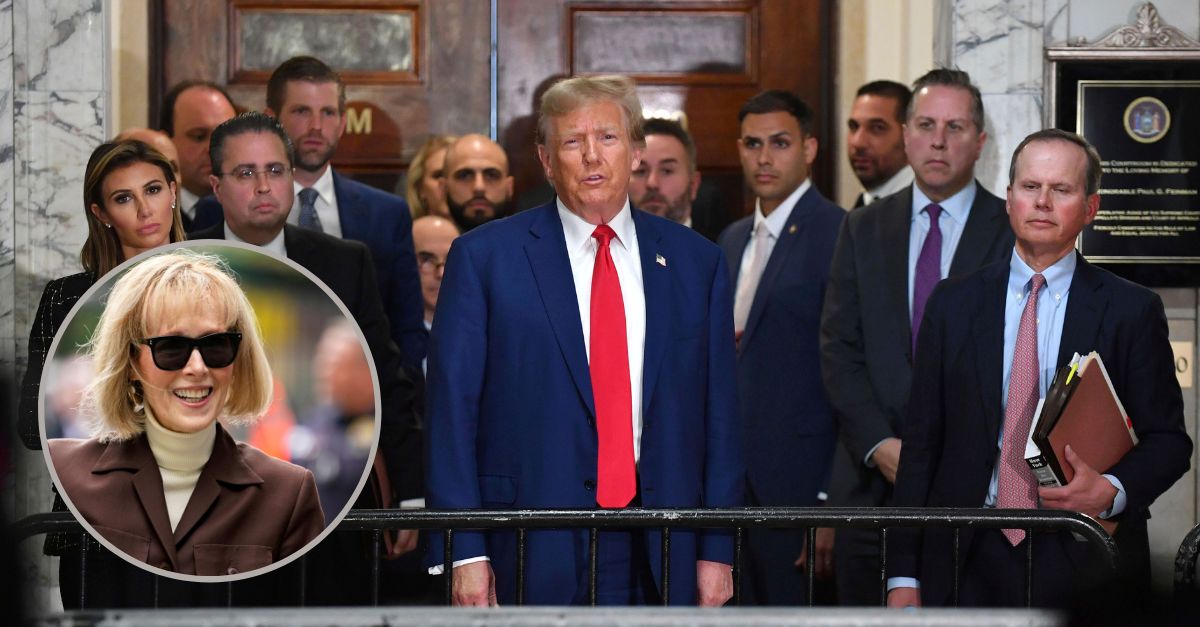
Background: Former President Donald Trump is seen on January 11, 2024 outside the New York State Supreme Courthouse on the day of closing arguments during his civil business fraud trial case in New York City (File Photo by: zz/Andrea Renault/STAR MAX/IPx 2024 1/11/24). Inset: Left: E. Jean Carroll arrives at Manhattan federal court, Tuesday, May 9, 2023, in New York (AP, John Minchillo).
Writer E. Jean Carroll is urging a federal appeals court to uphold the multimillion dollar defamation judgment owed to her by Donald Trump after he argued that the U.S. Supreme Court’s sweeping presidential immunity ruling shields him from criminal prosecution as well as civil liability.
In a 71-page brief filed Monday with the U.S. Court of Appeals for the Second Circuit, Carroll asserted that a U.S. president “is not above the law,” stating that such a tenant is a “fundamental principal of our democracy” that was further reiterated by the Supreme Court’s presidential immunity decision.
Trump in September filed court documents characterizing the case — as well as Carroll’s other case against him — as a “miscarriage of justice” that had been “perpetrated for political purposes and in seeking unjust pecuniary gain,” and further claimed that he was immune from the $83.3 million judgment against him.
“First, Presidential immunity shields from liability President Trump’s public statements issued in his official capacity through official White House channels,” the September filing from Trump’s attorney stated. “The Supreme Court’s recent decision in Trump v. United States, contravenes this Court’s prior holding that Presidential immunity may be forfeited through inadvertence or inaction. Presidential immunity forecloses any liability here and requires the complete dismissal of all claims.”
Carroll’s attorney pushed back hard on the president’s assertions, particularly his claim that presidential immunity should shield him from the civil judgment.
“When a President speaks publicly, whether he enjoys any immunity depends on the ‘content, form, and context’ of his communications,” Carroll’s attorney wrote, citing to the same Supreme Court case. “And if there were ever a case where immunity does not shield a President’s speech, this one is it. Donald Trump was not speaking here about a governmental policy or a function of his responsibilities as President. He was defaming Carroll because of her revelation that many years before he assumed office, he sexually assaulted her. The defamation at issue concerned quintessentially ‘personal’ conduct.”
Carroll’s attorney also emphasized that when Trump chose to litigate Carroll’s defamation claim, he did not raise the defense of presidential immunity until the day before the trial was scheduled to start. The presiding judge held that not only did presidential immunity not apply to Trump’s defamatory statements about Carroll, but that even if it did, Trump had chosen to waive that immunity.
The latest filing in the protracted legal battle between Trump and Carroll comes less than a month after the same New York-based federal appeals court upheld a $5 million judgment a jury awarded to Carroll in a different defamation lawsuit filed against Trump. In that case, the jury found that Trump sexually abused Carroll in the dressing room of New York City department store Bergdorf Goodman sometime in the late 1990s — and later defamed her when denying both the allegations and that he ever knew her.
The second case, which resulted in the $83 million judgment, was filed after Trump in 2019 continued calling Carroll a liar and denied knowing her. The presiding judge in that case determined that because a jury had previously found Trump liable for sexually abusing Carroll, it was an established fact for the purpose of the second trial and he therefore made his defamatory statements with actual malice.
Trump argued that the judge erred in failing to consolidate the two cases, which “reduced this case to a damages-only trial and prevented President Trump from presenting devastating evidence.”







